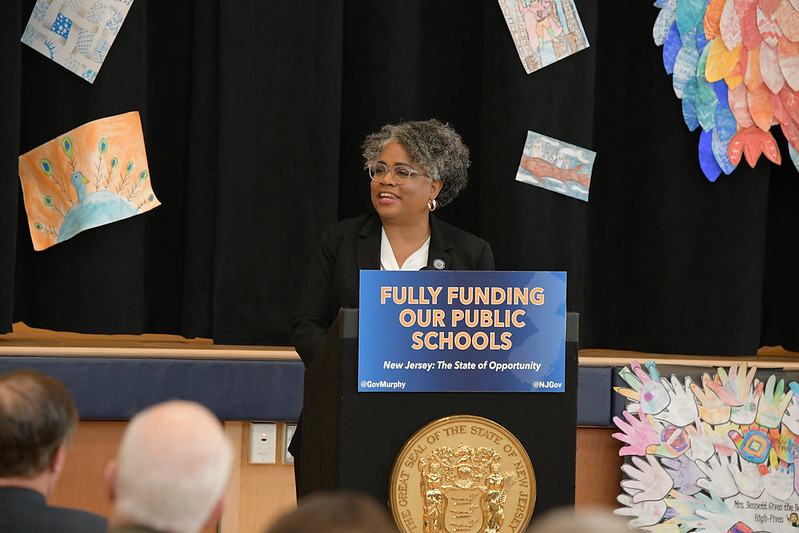Here’s a best practice for state departments of education: treat oversight boards respectfully and communicate all proposals in advance of public hearings. Yet at yesterday’s six-hour State Board of Education meeting, attendees witnessed a Department of Education that either regards the board as a rubber stamp or doesn’t understand the process of checks and balances. When board members protested, Acting Commissioner Angelica Allen-McMillan shot back, “don’t present us as incompetent.”
It was not a good look for the Murphy Administration.
Here’s what happened: Allen-McMillan and her staff appeared to be trying to bulldoze through a plethora of changes that board members were seeing for the first time. (Big binders of information weren’t sent out until Friday afternoon and apparently much of it hadn’t been discussed in committees.) One board member spoke for at least most of the group when he remonstrated Allen-McMillan for keeping them “out of the loop.”
First let’s look at the Board’s expressions of discontent with the top brass at the DOE and then their reaction to some of the proposed changes to the regulations that govern NJ educator preparation, certification, and professional development.
President Kathy Goldenberg: “This is not the way we’ve done things for five years. [Proposals of this magnitude] have never gone to the public before it goes to the board.”
Joseph Ricca: “It is so difficult for us to hear this for the first time. We can’t process this in real time–it doesn’t look good because it is a breakdown in communication [between the DOE and the State Board]. Yes, we had the slide deck but we did not have access. When I see my president asking questions it shows you haven’t given us proper access [to air our concerns].”
Mary Elizabeth Gazi: “You did not give us information in a timely fashion. Before we even started on this chapter [of regulations], we were asked to put aside additional committee time and we all made this commitment to go thoughtfully through this copious information we got Friday afternoon. You’re not giving us opportunities to process information and do our jobs.
Elaine Bobrove: “You need to send copies of entire powerpoints to us, not hundreds of pages in a binder.”
Here’s Allen-McMillan’s reply:
The Board received the information last Friday. We have made great strides in providing information to committees. For us to hear you’re just hearing this doesn’t speak to the process. Let’s be fully transparent here. You are asking questions which we welcome. Please do not present us as incompetent.
Board members had many concerns about the DOE’s proposed changes in the regulations regarding educator preparation, certification, and professional development.
Here’s the deal. The DOE and Allen-McMillan want to give prospective teachers more options to qualify for teaching licenses to diversify the teacher pipeline, address teacher shortages,* and hopefully raise student achievement, especially for children of color. For instance, a Black student who has a Black teacher before the end of third grade is 13% more likely to go to college and if they have two they’re 32% more likely. Diversity matters.
Also, there are valid concerns about the qualifying tests prospective teachers have to pass. Some regard them as culturally-biased against teachers of color and, anyway, just because you pass the written driver’s test doesn’t mean you can drive a car safely, right? There are great reasons for adding flexibility and alternative pathways to the teacher certification process.
But how does one balance that need without lowering the bar? That’s a question Board members asked; the DOE had no answer.
To give you a clearer sense of the disconnect, here are three proposed amendments from the DOE (full presentation here):
- One of the teacher-qualifying tests, the Praxis, tests content knowledge. Currently prospective teachers have to score in the top-third of test-takers. The DOE would change that to “top-half.”
- Another proposal would give the Commissioner the power to set her own “qualifying minimum score” on the SAT, ACT, or GRE.
- Another would lower the number of credits a teacher needs to receive accreditation in a related subject area, like a biology teacher getting certified in chemistry. Currently the requirement is 30 college credits but the DOE would lower that to 15 credits.
Board members tried to delve into the implications of these changes. Vice President Andrew Mulvihill asked Allen-McMillan, “what is the impact of lowering the minimum score? Do you have any data on that?”
“We don’t have any data,” replied the Commissioner.
Mulvihill pushed back: “You didn’t answer my question. We want our teachers to be qualified. Will this bring in folks who aren’t qualified? If we keep lowering standards, what’s the impact? I’m happy to have that answer sometime in the future.” (Board members won’t vote until October on the amendments.)
President Goldenberg (re: the lowering of credits to get certified: “Is there a con?”
Answer: “There is no con.”
Then things got stickier. The DOE is proposing a set of changes to wording that seems less relevant to regulations than to cultural commentary. Slides 87-89 of the powerpoint list 11 items that all contain this phrase: “results in equitable and excellent outcomes for all students.” (Example “Professional learning results in equitable and excellent outcomes for all students when educators prioritize equity in professional learning practices, identify and address their own biases.”)
Hmm. If all teachers teach equitably (what does that mean?), then all students will have “equitable and excellent outcomes.” Does that mean that we haven’t achieved academic equity until every student gets an “A”? Is the DOE saying every human being has the same academic potential, that there is no spectrum of abilities, that we’re all intellectual clones? Did I nearly fail 9th grade algebra because I wasn’t taught “equitably”?
Pres. Goldenberg takes the lead: “We talk about equitable opportunities but it’s hard to have equitable outcomes, isn’t it?”
Allen-McMillan: “Everything must be seen through an equity lens. Individuals may have biases. At the DOE we value the lens of equity, we value the processes that would be equitable.”
Let’s end on a positive note: Great presentation on Camden Public School District’s progress by Superintendent Katrina McCombs! Here’s Mulvihill’s reaction: “I am amazed by your achievements. You are making tremendous progress–my hats off to you and I thank you so much for your commitment.”
More to come.
*One invalid reason for changing regulations: there is not a teacher shortage, except for STEM fields, special education, and bilingual teachers; the data is is far more nuanced.
(Photo courtesy of NJ Monitor.)



